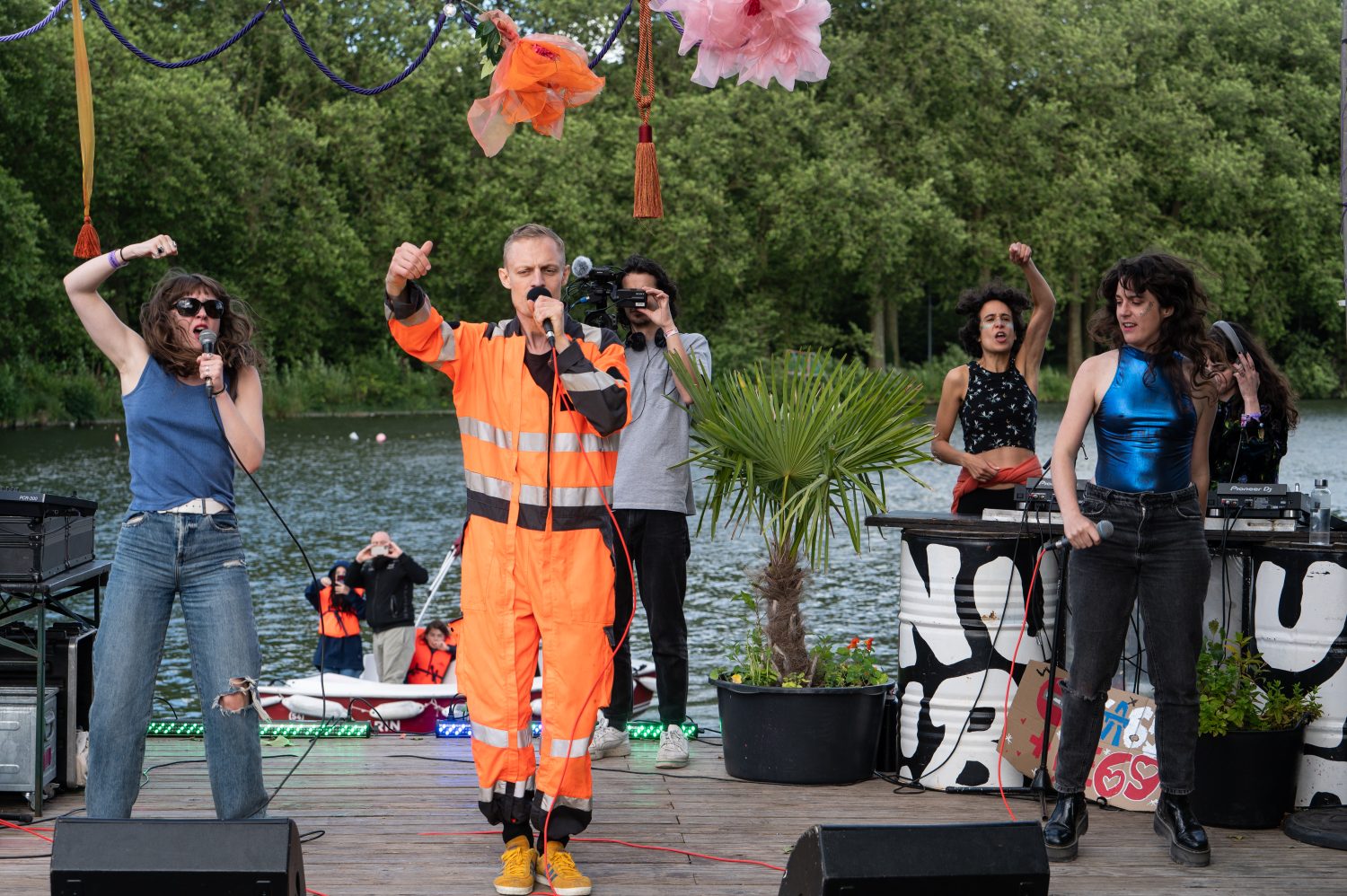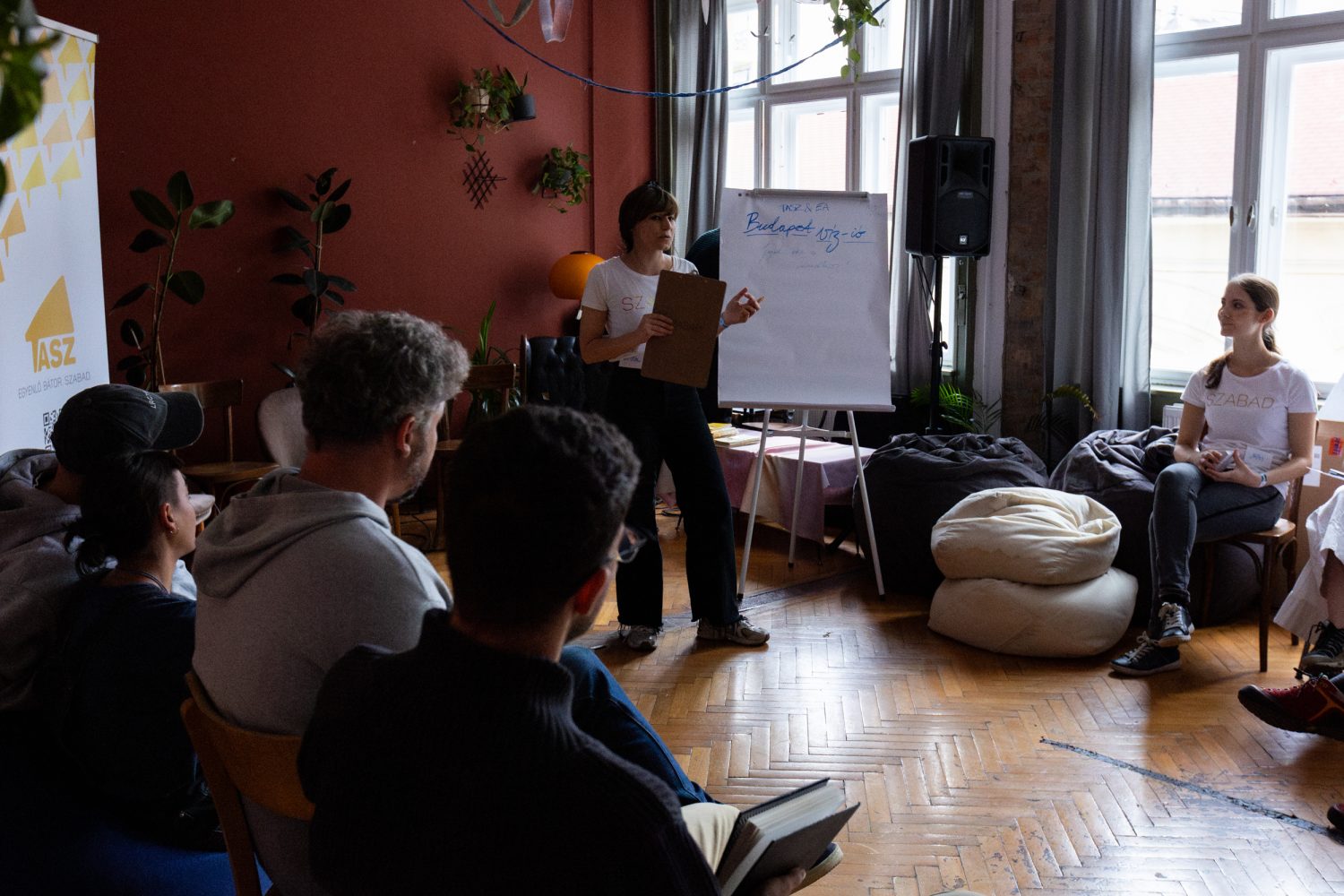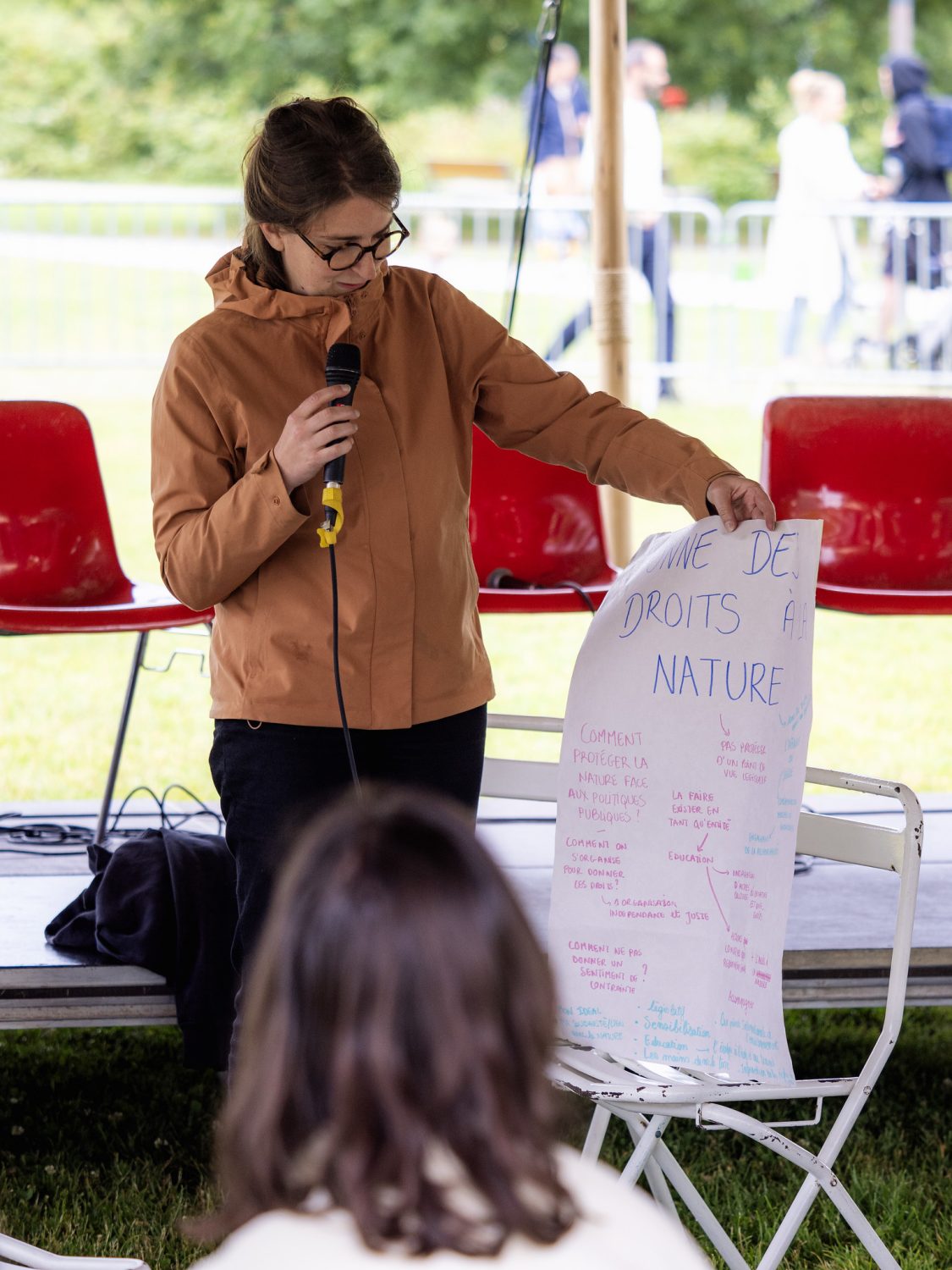by Csenge Schneider-Lonhart

In the summer of 2024, a special floating festival took place in Europe. Fluctuations is Europe’s first multistop river festival that combines culture, democracy, and ecology to write purposeful and hopeful narratives along the continent’s waterways, navigated by a riverboat serving as both an artistic stage and an artivist residence. At each stop, it unfolds a kaleidoscopic festival, featuring concerts & DJ sets, citizen assemblies, participatory workshops, a sustainable food court, and a village bringing together ecological vendors, NGOs, and impact companies. This year, the festival traveled through three cities by boat: Lille, Brussels, and Utrecht.
This prototype event laid the groundwork for a sustainable transnational festival, connecting regions through an alternative geographical approach—not by national borders, but along the shared path of a river.
In the fourth city, Budapest, the festival had to be relocated, topically due to the decade’s flood. Fluctuations was hosted at Turbine Cultural Center, where a collaboration between European Alternatives and TASZ (The Hungarian Civil Liberties Union) to create a citizens assembly took place, themed to participants’ desires on the usage of the river in Budapest, the Danube.

Could you tell us a bit about TASZ and what you do?
Nóri:
We’re a human rights advocacy organization, and our main goal is to ensure that everyone knows their fundamental rights and can use the tools the law provides. You could call it classic empowerment. We help citizens navigate the maze of state bureaucracy, in many cases, we help people stand up against state oppression.
What are the biggest challenges for you in the current political context?
Lilla:
One of the biggest challenges—and I think this reflects the current political situation—is that people often don’t know where to turn for information. One of TASZ’s main functions is our free legal aid service. It’s not just cases of severe, obvious rights violations that come to us; people are so starved for information that they don’t know where to go for help. No one guides them, so they’re thrilled when a search on the internet leads them to us, and we can give them a clear, well-developed answer.
Another challenge reflecting Hungary’s political climate is fear. Many people are too afraid to ask their superiors even simple employment law questions, which in other environments wouldn’t be a problem, so they turn to a legal aid service instead to see what legal options they have. Often, these are problems that don’t even require legal intervention—they could just be discussed. It’s difficult to navigate because people don’t know if their fear of retaliation is justified or if it’s just the prevailing atmosphere making them think they’ll get into trouble.
Léna:
What Lilla said reminded me of a conversation we had with one of our colleagues. The primary goal of our organization is to protect fundamental rights, and our activities are built around that. However, many people contact us with basic employment or social security questions, or about how to access childcare benefits. Our informational materials increasingly cover these topics because, as Lilla mentioned, people can’t find this information, and the state doesn’t provide a platform for it. As a result, our organization takes on a more practical role, offering information and help on everyday issues. Many people don’t have their basic needs met, so concerns about dignity or freedom of expression come later. Of course, many people do contact us about those issues, but it’s clear that society has left people to fend for themselves.
What strategies could be developed for authorities to make people more informed about their rights? Why doesn’t the state currently have such a strategy?
Nóra:
That’s a great question, and one we’d like an answer to as well. The general excuse we hear is a lack of capacity. Authorities claim they have too much to do already, even basic tasks. For example, environmental monitoring or thoroughly checking environmental conditions when issuing permits often doesn’t happen because they lack the resources.
It’s not sustainable for civil organizations to fill in for the state. Yet, in Hungary today, that’s what happens—not just with us, but many civil organizations take on state functions.
Léna:
I’d add that there doesn’t seem to be any awareness that state tools need to be made accessible to citizens. The mentality appears to be missing. State websites are outdated, and poor user experience and interface design make it hard for citizens to use them. It’s not just about having the information but also how it’s presented. There’s very little effort from the state to make this information truly accessible.
Lilla:
There’s a mindset problem on both sides. Citizens rarely expect a partnership with state institutions, though that’s often what’s needed. For a functioning democracy, people need to know they’re not shouting into a void—that someone is listening. Contacting legal aid is often a huge step. Many people operate at such a basic level because they lack essential resources, so it doesn’t occur to them that their fundamental rights might be violated. There’s no demand for these rights because they don’t know they have them or how to assert them. There’s a huge gap on the state side, but also a lack of empowerment among citizens, which could be addressed through state incentives or education.
I’d like to shift now to what you did at the Fluctuations festival. How did you get involved with it, and how did you find the format of a Citizen Assembly?
Nóra:
I was initially quite intimidated. Our organization hadn’t done anything like this before. We reviewed the materials; thematic guides, manifestos, and the Assembly example from Transylvania you shared, Csenge, about a previous assembly organized by the European Alternatives. That sparked our interest, and we felt better prepared. We wanted people’s voices to be heard, so we invited municipal representatives and experts, creating a space for citizens to share their ideas.
Léna:
It was amazing to see how eager people were to get involved—and they did. The format worked really well. It was such a refreshing contrast to the usual apathy often seen in Hungarian society. In these settings, that apathy seems to vanish completely. I don’t even think about it during events like music festivals. These examples show that people are willing and ready to engage.
Could you describe the topic of the assembly and the ideas that emerged? Also, what will happen with the collected ideas?
Nóri:
The Danube seemed like a natural choice, especially since the event was initially planned to be held on the riverside, putting us in physical proximity to it. Even though we ended up a bit further from the river, participants still engaged deeply with the topic.
It felt like a big dream to involve municipal representatives and experts, but it came true. Participants generated excellent ideas, and the experts validated them. Miki from Valyo provided insights about what had already been tried and what was new, while Péter offered reality checks on the feasibility of ideas. It was impactful for participants to see a decision-maker genuinely listening to them. Everyone understood that the ideas would be forwarded to the municipality, and Péter would help ensure they were taken seriously. It felt incredibly democratic, and we need more of this. This format truly convinced me.
Which idea was your favorite?
Nóra:
I loved the concept of swimming along the river and imagining it happening right in front of the Parliament. It was wonderful to see such creative thinking.
Lilla:
I found the “liquid public space” concept fascinating. I’d love to attend an open-air cinema on the water, relaxing by the river. I connected deeply when Miki mentioned that public spaces are underutilized and thus fall out of focus. The idea of reclaiming these spaces for the people who rightfully own them resonated with me. It’s a compelling initiative.
Léna:
Each idea was exciting, especially because they were so diverse. Beyond recreation and relaxation, I was intrigued by the proposal to use the river for a new form of transportation. One participant mentioned living by the Danube and envisioned commuting by kayak or canoe. The idea of a communal kayak-sharing system, similar to the bike-sharing program, was really interesting. Imagine people, not just large boats or water buses, navigating the river. It’s a novel way to bring people closer to the water.

The ideas generated during the citizen assembly in Budapest were compiled into a manifesto and sent to the local authorities, with the aim of making them a reality. By engaging with local experts and decision-makers, the participants’ voices were heard, and their creative solutions have the potential to transform Budapest’s relationship with the Danube. It is our hope that these ideas will inspire future projects and contribute to a more inclusive, sustainable urban landscape.
Csenge Schneider-Lonhart is an artivist based in Berlin working for European Alternatives in the imagine stream projects. Her background is predominantly in theatre, and she is currently working on the ‘Theatre of the Oppressed’ project, using theatre to empower and inspire citizens in demanding their political rights. Csenge is also part of the movement Social Housing NOW!, which is a local movement for public housing and housing justice.